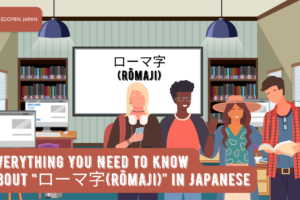Interested in learning Japanese? How about starting by learning some cute Japanese words and phrases? Japanese is a fascinating and rich language with a long history. It’s also a language full of cute words and expressions to describe just the right feeling, like “Momo or peach” and “Doki-Doki or feeling excited”. Today, we’ve got a list of some of the cutest Japanese words that every Japanese learner can appreciate.
When you learn Japanese from a textbook, you get all the useful words and phrases for communication. It can sometimes be a bit dry without the fun stuff. The Japanese language has a lot of cute and fun words that aren’t always introduced when you first start learning Japanese.
Furthermore, if you’re learning Japanese and frequently get perplexed about using it correctly to prevent misunderstandings and other issues, kindly check out our suggested readings below:
Read also:
Moshi-Moshi: How to Answer Phone in Japanese
Everything to Know about “Rōmaji” in Japanese
How to Say Congratulation in Japanese?
Contents
A Brief Overview to Japanese Cute Phrases
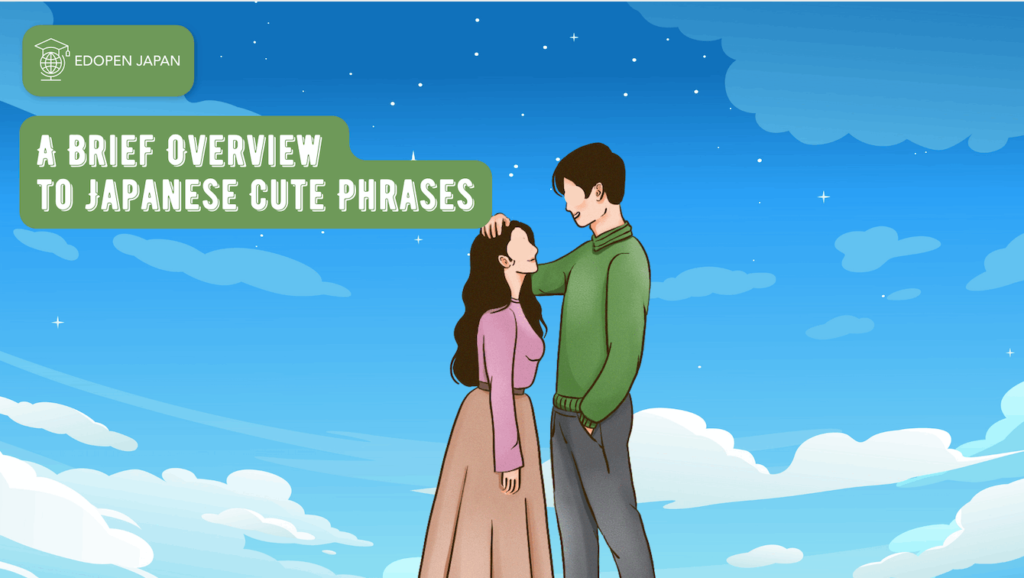
Japanese has a multitude of words. The most effective way of starting the learning process of Japanese is through Hiragana. You can start by studying Hiragana, which will help you establish a solid foundation for reading the Japanese language. Hiragana is employed in constructing sentences around more complex characters, such as Kanji.
Another way to write Japanese is using “Katakana”. Katakana is similar to hiragana but instead is used to represent sounds and words borrowed from other languages (such as “Pinku” or ピンク, which means pink).
Within the Japanese language, there are certain phrases that can come across as humorous when spoken. Native speakers may not find such phrases amusing. However, for some non-native speakers who are just beginning to learn Japanese, the potential hilarity is quite intense. This is one of the fascinating aspects of the Japanese language.
Here are some Japanese words that are either cute-sounding or refer to cute things for a start. We hope you enjoy learning the cute Japanese expressions listed below!
The Cutest Japanese Phrases You Need to Know
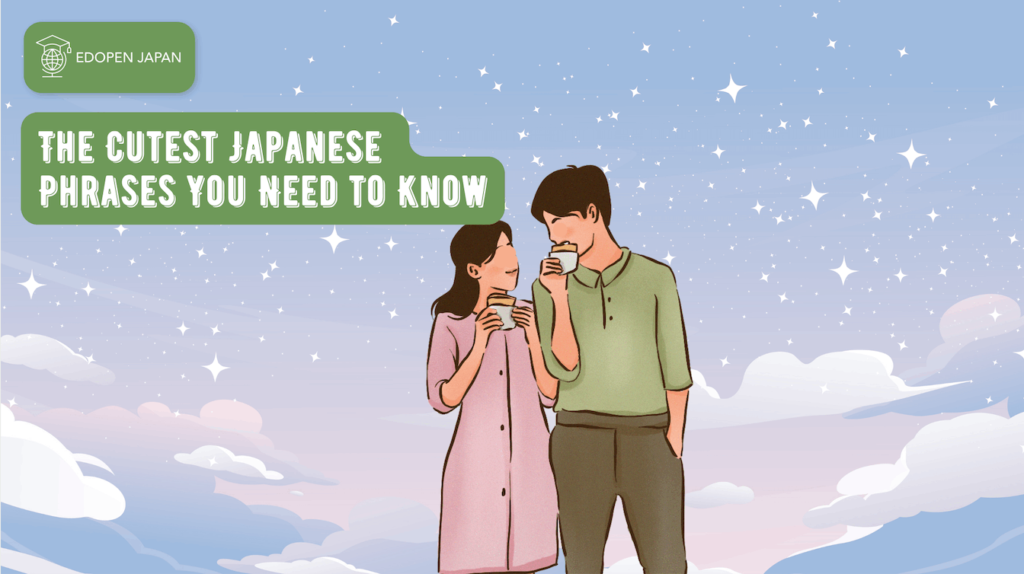
These are the most popular cute Japanese phrases you can use in everyday conversation! Understanding their meaning and proper usage can enhance your knowledge of Japanese language and culture. Let’s begin!
1. かわいい – Kawaii (Cute)
This is probably one of the most commonly used Japanese words you already know that connotes cuteness. Use it to express admiration for anything that you find cute. Although it translates to “adorable” and “cute,” this word signifies a broader spectrum of meanings.
You can use “kawaii” to refer to a kitten, a puppy, or to describe an action as adorable. This is the case in which the word carries the meaning of “adorable” that elicits the desire to show affection. Although you can render “kawaii” in kanji as 可愛い, it is more common to write it in hiragana.
2. きれい – Kirei (Pretty)
This is another enjoyable and complimentary term. Similar to using “Kawaii”[かわいい], use “Kirei”[きれい] to express your admiration for something you believe is beautiful. Although “Kawaii” is a popular compliment, “Kirei” is a higher level of adoration.
This term in Japanese means “attractive” or “good-looking”. Not only does the expression sound appealing when pronounced, but it is also regarded as a charming compliment. You can use this term to compliment your girlfriend or among your female friends.
3. ちょっと – Chotto (Just a Little..)
The word “Chotto.. that has a meaning just a little..” is not just one of the most practical terms in the Japanese language, but it is also one of the most adorable ones. It is common to hear individuals use “Chotto” to indicate a small quantity or a brief period of time in numerous circumstances. Additionally, when someone is requested to hold on, they may use this expression.
The Example of ちょっと – Chotto (Just a Little..)
| Japanese | English |
| 1. ちょっと待ってください。 Chotto matte-kudasai. | Please wait a little bit or for a little while. |
| 2. ちょっと英語が話せます。 Kare wa chotto eigo-ga hanaseru. | He can speak a little English. |
This term can also be employed to provide a courteous negative reaction or to decline indirectly. Considering the great importance of politeness in the Japanese language, it is essential to be aware of it. Please look at the following example of sentences:
| Japanese | English |
| 3. 飲みに行かない? Nomi-ni ikanai? あー、ちょっと… Aa, chotto… | Want to go out drinking? I can’t… (Chotto here means “cannot” indirectly) |
Here, we have another term for describing ‘just a little bit’. It has a similar meaning to ‘chotto’, although it’s used less frequently. However, that doesn’t make it less adorable.
| Japanese | English |
| 4. 少し考えさせて。 Sukoshi kangaesasete. | Let me think it over a little. |
Japanese Phrases That Use Onomatopoeia & Absolutely Adorable
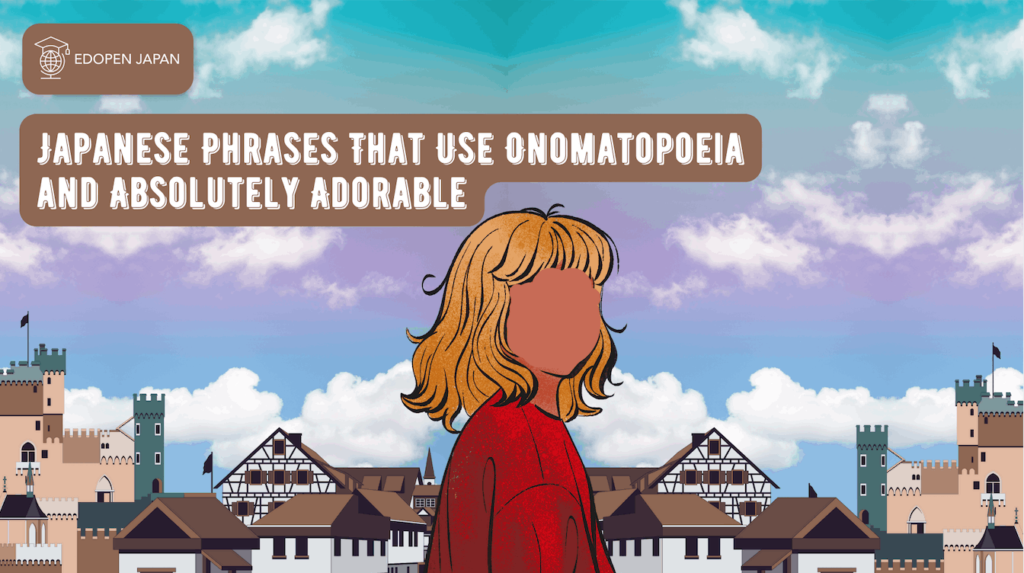
1. ドキドキ – doki-doki (excited)
Do you remember the feeling of nervousness when you see someone you like? Or when your heart beats quickly, as though it’s trying to escape your chest? In Japanese, this feeling can be expressed as ‘Doki doki’ (ドキドキ). The word itself imitates the sound of a rapid heartbeat.
The word can likewise function as a verb by appending “suru (する)” to become “Doki-doki suru (ドキドキする)”. This translates to a sense of excitement (with a racing heart), or when you feel butterflies in your stomach.
Be careful not to confuse it with “toki-doki (時々)”, which means ”Sometimes”. Please remember!
| どきどき or ドキドキ (doki – doki), meaning excited |
| ときどき or 時々 (tokidoki), meaning sometimes |
2. ニコニコ – niko-niko (smile)
This is an adorable way of expressing a smile, mimicking the repetitive or sound-alike qualities of cute Japanese words. In Japanese, the word for smile is “Emi (笑み)”. The Japanese kanji used for the verb “To laugh (笑う)” is the same as the one used for “smile (笑み)”.
While these are the most common ways to express those emotions, why not experiment with a new word for “smile”? “Niko-niko (にこにこ)” is an appealing alternative to refer to your or someone else’s smile in Japanese.
3. くらくら– kura-kura (dizzy)
Unlike most cute Japanese words, “Kura-kura (くらくら)” just sounds cute. It actually means “dizzy”. When you feel dizzy or lightheaded, you can describe the feeling as “kura-kura (クラクラ)”. Even if the act of being dizzy isn’t all that fun, the word has a cute ring to it. Use it as a verb by adding “suru (する)” to make “kura-kura suru (クラクラする)”.
4. まごまご – mago-mago (confused)
Similar to kura – kura, this is a repetitive sound for an unpleasant state, confusion. Have you ever felt confused, like your head is spinning as you try to process information? “Mago-mago” (まごまご) is the Japanese word for “confused. Similar to dizziness, being confused is not the most pleasant thing. But at least the word is cute to say.
5. ゴロゴロ – goro-goro (the rumbling of thunder and stomachs)
The Japanese language has a special relationship with onomatopoeia and words that refer to sounds. The adorable word “goro-goro” is a prime example. This cute word can refer to any kind of rumbling sound. This includes thunder on a cloudy day, but it’s also used for hungry bellies and lazy cats.
We can add “suru” after “goro-goro” to make it a verb. And as a verb, “ゴロゴロする (goro-goro-suru)”, it can mean all of these things, as well as spending the day being idle and lazy.
Hint – Like most words that are representations of sounds, it is written in katakana. Have a look at the example sentences below for a better understanding!
| 今日は家でゴロゴロしたい。 Kyouwa Ie de Goro-goro-shitai. I want to just chill at home today. |
6. ペコペコ – peko-peko (hungry
The state of being very hungry. When we use this, it means I am so hungry. The sound that an empty stomach makes (Peko-peko [from the verb “Hekomu” [へこむ], which means to have caved in]) gives us a way to say “I am hungry” (Onaka ga Peko-peko, お腹がペコペコ). Not only the sounds, but also the sensations. This concept also works for many Japanese food words.
7. キラキラ –kira-kira (shiny)
Kira-kira (きらきら) means “to shine” or “to glow”. Pika-pika (ぴかぴか) is another word that has a similar meaning to “kira-kira”. We often use the word “kira-kira” to say stars, but also to express something shiny.
Cute Japanese Words for Nouns
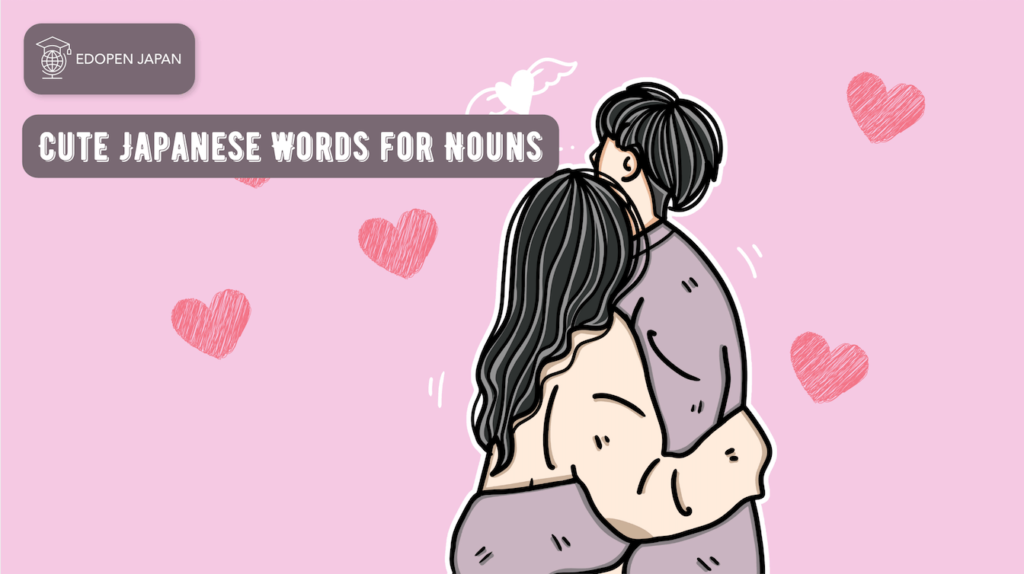
- ねこ – neko (cat)
Japan loves cats, and ねこ is the Japanese word for both cats and cat-like things. Amusingly, adding an extra こ changes “cat” to “kitten (こねこ)”. - りんご – ringo (apple)
This is the word used for” Apple.” - もも – momo (peach)
This repetitive word is the word “peach. We use “peach” as a term of endearment. This next cute Japanese word is quite common to use as a nickname for someone. In fact, some people have this as their real name! “Momo (もも)” means “peach” in Japanese. Because it’s such a cute and endearing word, many Japanese people would name their children or pets “momo”. - たまご – tamago (egg)
This fun to say word means “egg”. One of the first words we learn in Japanese is “Tamago” (卵), which means “egg”. And most of the time, it really just means “egg. However, in Japanese culture, it sometimes has a different meaning. By itself, it can mean “rookie” or “noobie”. If you attach it to something else, it can mean that you’re a beginner in that skill. “Dezainā no tamago” (デザイナーの卵) means that you’re a beginner designer.
Ex: デザイナーの卵です。
Designer-no-tamago desu means I’m a rookie illustrator. - ばら – bara (roses)
This word is used for roses. There’s a word in Japanese that translates to “scattered” or “scattering,” and it’s “bara-bara” (バラバラ). However, if you take only half of the word, “bara” (ばら) actually refers to a rose. You may want to be careful when referring to the beautiful flower a few times. If you say “rose, rose,” which is “bara, bara,” you may be conveying a completely different meaning! - 子 (こ) or Ko (the infant marker)
This next one isn’t really a word, but it’s a prefix that helps make other cute Japanese words. The particle 子 (Ko) has many meanings, and one of them is to refer to children or offspring. As such, the Japanese use it as a prefix to make the names of various baby animals.
Ex: 子猫 (Koneko) – “Kitten”, 子犬 (Koinu) – “Puppy”, 子羊 (Kohitsuji) – “Lamb”, and 子牛 (Koushi) -“Calf.” - モモンガ – Momonga (The Flying Squirrel)
Did you know that there are flying squirrels in the forests of Honshu, Japan? In fact, Japan has one of the cutest animals with an equally cute name – “Momonga” (モモンガ). The word can refer to flying squirrels, but is most commonly used to refer to the Japanese dwarf flying squirrel. And the cute Japanese word is perfect for what it describes.
The Other Best Known Cute Japanese Phrases
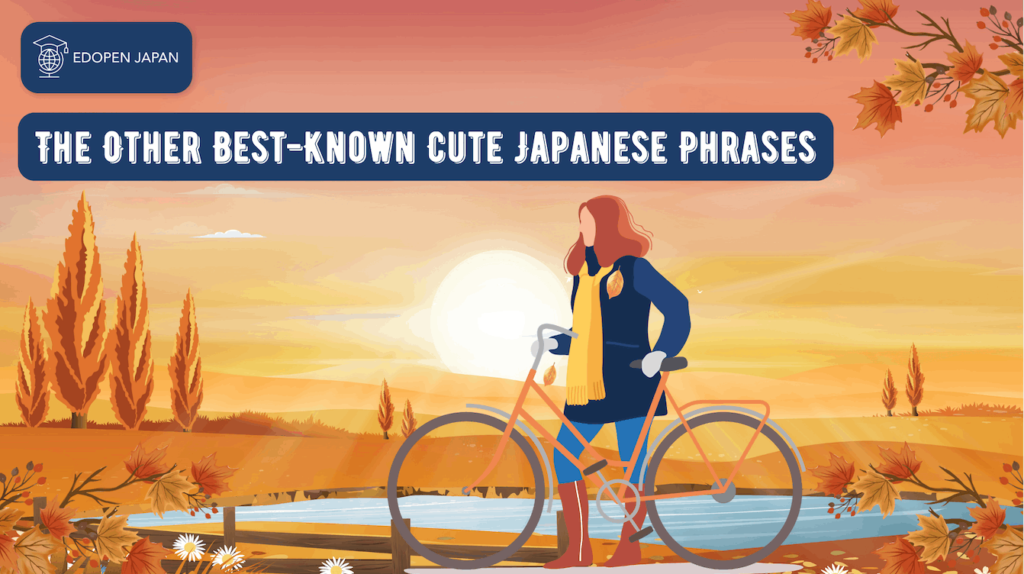
ニャー(にゃー) – Nyaa (The Cat’s Meow)
This is the last onomatopoeia on our list, but we promise it’s worth it. “Nyaa” (ニャー) is the sound that cats make. Think of it as the Japanese “meow. The difference is that in Japanese, you can customize “Nyaa” to be even cuter. You can simply double the word “Nyanya” (ニャーニャー). And you can add an “n” to get “Nyan” (ニャン) to make it more adorable.
Have a look at the summary list of examples of the cutest Japanese phrases below!
| English | Japanese | Meaning |
| 1. Kawaii | かわいい | Cute |
| 2. Kirei | きれい(綺麗) | Beautiful |
| 3. Chotto | ちょっと | Just a little |
| 4. Doki-doki | どきどき(ドキドキ) | Excited |
| 5. Niko-niko | にこにこ(ニコニコ) | Smile |
| 6. Kura-kura | くらくら(クラクラ) | Dizzy |
| 7. Mago-mago | まごまご | Confused |
| 8. Goro-goro | ごろごろ(ゴロゴロ) | Rumbling of Thunder and Stomachs |
| 9. Peko-peko | ペコペコ(ペコペコ) | Hungry |
| 10. Kira-kira | きらきら(キラキラ) | Shiny |
| 11. Neko | ねこ | Cat |
| 12. Ringo | りんご | Apple |
| 13. Momo | もも | Peach |
| 14. Tamago | たまご(卵) | Egg / Rookie |
| 15. Bara | バラ | Rose / Scattered |
| 16. Ko | 子 | Infant |
| 17. Momonga | ももんが(モモンガ) | Flying Squirrel |
Which word is the cutest?
There are many more cute Japanese words. The list is endless. But hopefully these 20 highlighted ones are more than enough to make your heart melt for now. What do you think is the cutest Japanese word? I am sure it will be helpful to use these phrases in everyday conversation and you will have fun learning Japanese!
Conclusion
- There are many cute words in Japanese, and they are written in “Hiragana” and “Katakana”. Sometimes “Kanji”. Also, Katakana is used for most words that represent a sound.
- Some words such as “bara,” “tamago,” and “goro-goro” have 2 different meanings, so please be careful when using them. There are so many more cute words than this list, but for now it will be helpful for you to use these top phrases in everyday conversation.
Don’t forget to keep updating the information related to learning Japanese and other phrases that we have presented here just for you. Thank you for reading to the end. See you in the next article!






